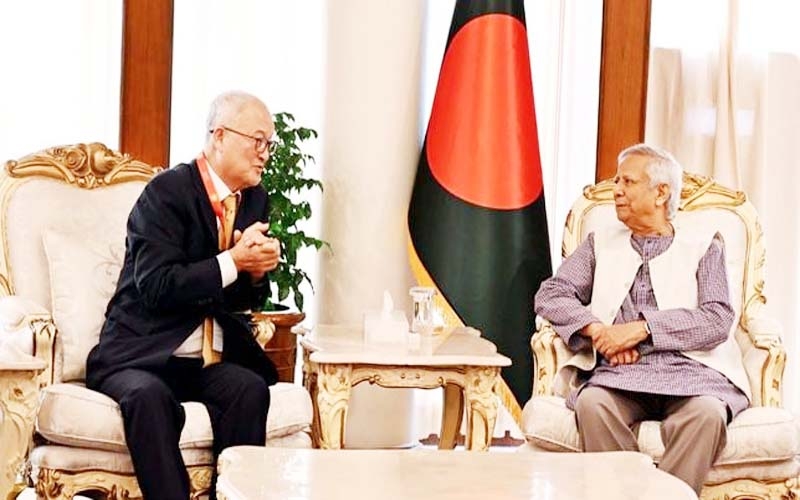- Security Council Divided on United States' Venezuela Action |
- Over 1.53m voters register for postal balloting: Shafiqul Alam |
- Bangladesh Bank to liquidate 9 NBFIs in financial sector reforms |
- Govt Moves to Clear Tk20,000cr Dues to Avoid Summer Outages |
- Maduro Pleads Not Guilty in US Court, Claims Presidency |
Yunus Calls for Unified Investment Promotion to Boost FDI

Chief Adviser Professor Muhammad Yunus on Tuesday directed authorities to resolve the land rights issue of the Korean Export Processing Zone (KEPZ) by early February and consolidate all investment promotion agencies under one umbrella to attract more foreign direct investment (FDI) to Bangladesh.
The directives came during a meeting with Kihak Sung, Chairman of Youngone Corporation, and other prominent foreign investors at the State Guest House Jamuna in Dhaka.
Kihak Sung, whose South Korean company is the largest exporter from Bangladesh, highlighted several challenges discouraging FDI in the country. He urged the government to address these issues to create a more favourable environment for large-scale investments.
Prof Yunus assured Sung that the land dispute surrounding KEPZ, a key obstacle to industrial investment, would be resolved by February 6.
“We want the Korean EPZ to serve as a model for Bangladesh, attracting significant investments and generating numerous jobs,” the Chief Adviser said.
Kihak Sung commended the Interim Government’s swift actions to address the longstanding issues, expressing optimism that these measures would encourage more Korean investors to consider Bangladesh.
“This will open doors for other investors. KEPZ is poised to become a model for investment,” he said.
Call for Efficient Port Operations
Sung also emphasised the need for expedited shipments through Chittagong Port, noting that delays were a major deterrent for high-end and fashion clothing orders from global brands.
“Fashion clothing requires rapid exports, ideally within 10-15 days, but in Bangladesh, shipments often take months,” he said, citing Vietnam as an example of efficient export logistics.
Prof Yunus acknowledged the issue and said Special Envoy Lutfey Siddiqi was working on plans to enhance the port’s efficiency, aiming to position Chittagong as a leading port in the region.
Streamlining Investment Agencies
Both Sung and British investor Mohammed A Matin stressed the importance of consolidating investment promotion agencies to provide streamlined, one-stop services for foreign investors.
In response, Prof Yunus said he had instructed the Bangladesh Investment Development Authority (BIDA) to bring all five investment promotion agencies under one office.
BIDA Chief Chowdhury Ashik Mahmud Bin Harun noted that the current fragmented structure was a legacy of past mismanagement but assured that efforts were underway to unify the agencies.
Focus on Training and Green Energy
Sung revealed that Youngone Corporation is establishing one of the world’s largest textile institutes in Bangladesh, set to train thousands of young professionals annually. He invited Prof Yunus to inaugurate the institute within the next three months.
Matin called for streamlining labour laws and introducing net metering for solar panels in export processing zones. He criticised the current policy, which imposes a 26% tax on solar panel imports for EPZ investors.
The Chief Adviser assured that labour reforms were in progress and hinted at introducing green channels at Chittagong Port to fast-track exports.
Global Praise for Reforms
Javier Carlos Santonja Olcina, Country Head of Inditex, lauded the Interim Government’s business reforms, calling them transformative.
“This is the new Bangladesh we need,” he said, expressing confidence in a significant rise in the country’s exports.
Paul Anthony Warren, Director of Dewhirst, also attended the meeting, along with other key stakeholders in the investment and export sectors.

